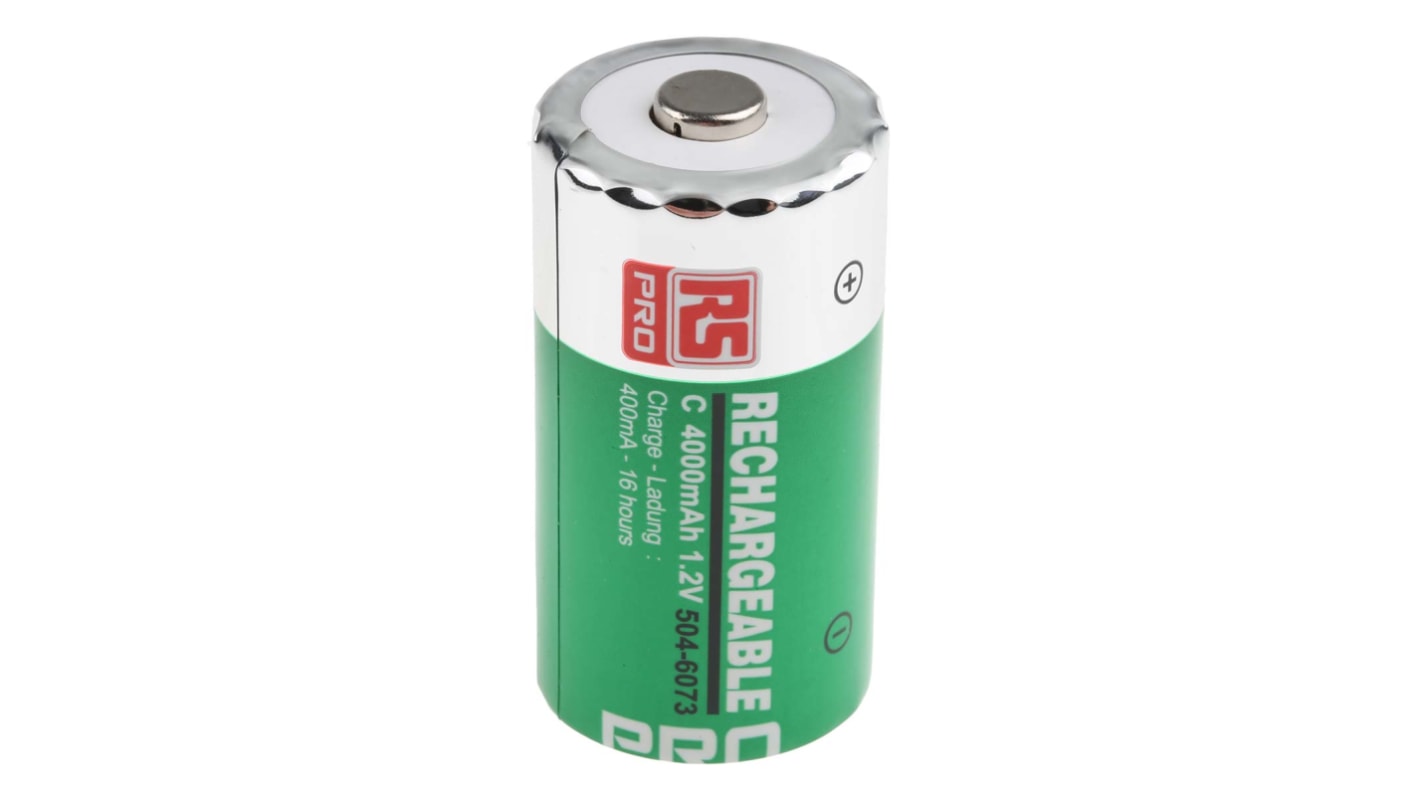RS PRO RS PRO NiMH Rechargeable C Batteries, 4Ah
- RS Stock No.:
- 504-6073
- Manufacturer:
- RS PRO
Bulk discount available
Price Each (In a Pack of 2)
HK$74.22
In stock for delivery within 3 working days*
* Delivery dates may change based on your chosen quantity and delivery address.
FREE delivery for orders over HK$850.00
Units | Per unit | Per Pack** |
|---|---|---|
| 2 - 8 | HK$74.22 | HK$148.44 |
| 10 + | HK$61.09 | HK$122.18 |
**price indicative
- RS Stock No.:
- 504-6073
- Manufacturer:
- RS PRO
RoHS Status: Exempt
- COO (Country of Origin):
- CN
RS NiMH Batteries
Nickle metal hydride batteries also known as NiMH batteries are a type of rechargeable battery used every day in various household and industrial items.
NiMH batteries have two to three times more capacity than a nickel-cadmium cell (NiCd) battery.
These batteries if stored in a cool, dry place can last for between 500 to 1000 charges, or 2 to 3 years. The more you charge NiMH, the longer they last.
Another name for this battery type is a secondary cell.
Features and Benefits
Rechargeable
Long lifespan – the battery lifespan is expressed in charge cycles. One cycle is a complete discharge followed by a complete recharge
NiMH batteries can outperform an alkaline battery in a single charge
Advantageous for high current drain devices
Increased confidence in the devise you are using
Various battery recycle schemes available
More environmentally friendly
Where Can I use NiMH Batteries?
Rechargeable batteries can be used in a number of everyday items such as:
• Smoke detectors
• Transistor radios
• Handheld test equipment
• Some electronic toys
• OEM applications (medical, wireless security, safety and industrial uses)
• Smoke detectors
• Transistor radios
• Handheld test equipment
• Some electronic toys
• OEM applications (medical, wireless security, safety and industrial uses)
RS Pro offers a range of rechargeable NiMH batteries. They are predominantly used in digital cameras, gadgets and other high drain devices, where with one single charge they can outperform an alkaline battery.
These batteries can be used in a number of everyday items:-
How to store batteries?
Digital Cameras
Handheld video consoles
Remote controlled cars
DIY tools
Medical devices
Radio’s
Torches
Avoid keeping batteries in drawers with metallic objects like paperclips, coins, other batteries or household items such as steel, wool, aluminium foil and keys. If these touch, this can be a potential fire hazard. Keep the batteries in their original packaging until ready to use.
Charging NiMH Batteries
Charging NiMH batteries correctly is key to their performance and lifespan.
All batteries are supplied with only a residual charge and should be charged at a continuous charge rate before use.
Are NiMH Batteries harmful?
The risk is reduced by not mixing different manufacturer battery types, batteries of different chemistries and by the replacement of all batteries at the same time.
Never expose NiMH batteries to extreme heat and be careful not to drop them as internal damage can easily occur.
Safety Advice
• Keep out of sight and reach of children
• Do not connect batteries in parallel
• Do not connect batteries in parallel
Keep out of sight and reach of children.
How to dispose of NiMH Batteries?
• All batteries are supplied with only a residual charge and should be charged at the continuous charge rate before use - they are not pre-charged for use
• Always install the batteries correctly as per instruction
• Ensure that the contact points are clean and conductive
• Do not mix different types of battery
• Do not dispose of in a fire
• Always install the batteries correctly as per instruction
• Ensure that the contact points are clean and conductive
• Do not mix different types of battery
• Do not dispose of in a fire
Recycle responsibly, a wide range of schemes are available.
Caution
Do not connect batteries in parallel.
Attribute | Value |
|---|---|
| Brand Range | RS PRO |
| Chemistry | NiMH |
| Capacity | 4Ah |
| Size | C |
| Terminal Type | Standard |
| Nominal Voltage | 1.2V |
| Operating Temperature Range | -10 → +60°C |
| Maximum Operating Temperature | +60°C |
| Minimum Operating Temperature | -10°C |
| IEC Name | HR14 |
| Low Self Discharge | Yes |

